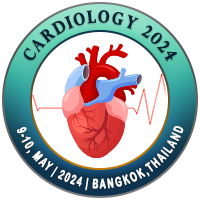.jpg)
Alina Cornea
Beacon Hospital, IrelandTitle: Surgical treatment in pulmonary hypertension: updates
Abstract
Pulmonary hypertension manifests consequently to various cardiac, pulmonary, and connective tissue disorders, often presenting as a multifactorial phenomenon. Given its diverse and complex origin, surgical intervention is typically reserved as a final recourse in the progression of these pathological conditions. This presentation follows the primary classification of pulmonary hypertension, encompassing pulmonary arterial hypertension, instances secondary to cardiac or pulmonary ailments, those associated with thromboembolic occurrences, and cases characterized by multifactorial mechanisms. The discourse comprehensively addresses pivotal surgical methodologies, examining them from the dual perspectives of the recipient and donor. Emphasis is placed on nuanced considerations such as surgical intervention indications, donor evaluation protocols, and procurement techniques. Procedures pertaining the recipient transplantation, including double lung transplantation and heart and lung en bloc transplantation are underscored. Particularly noteworthy are the distinct roles of pulmonary artery endarterectomy and balloon pulmonary angioplasty, both serving as complementary strategies for managing chronic pulmonary thromboembolism. In addition, a succinct survey provides insights into the application of prominent mechanical assist devices, serving either as supportive measures or as transitional interventions prior transplantation. In conclusion, addressing pulmonary hypertension through surgery is a complex endeavor that necessitates the collaboration of an interdisciplinary team to formulate personalized decisions, aiming to achieve optimal outcomes.
Biography
Alina Cornea graduated medical in Bucharest, Romania, and moved to Ireland in 2016. For years, she was involved in cardiothoracic surgery research, especially in heart and lung transplantation and mechanical circulatory support, publishing recently the results of her research in the thoracic surgery textbook “ Thoracic Surgery- cervical, thoracic and abdominal approaches, editors Nistor, Tsui et all, Springer 2020”, also “ New insights in pulmonary hypertension, editors Surani S et all” 2023 ( chapter), and “ Pulmonary Emphysema- Recent updates, editor Kian Chung Ong ( chapter, accepted for publication summer 2024) She is currently involved in the development of Research Center of Beacon Academy from Dublin Ireland, which is a program design to train students and junior doctors in medical and surgical sciences with a special emphasizes on clinical research in pulmonary hypertension and cardiovascular diseases.

